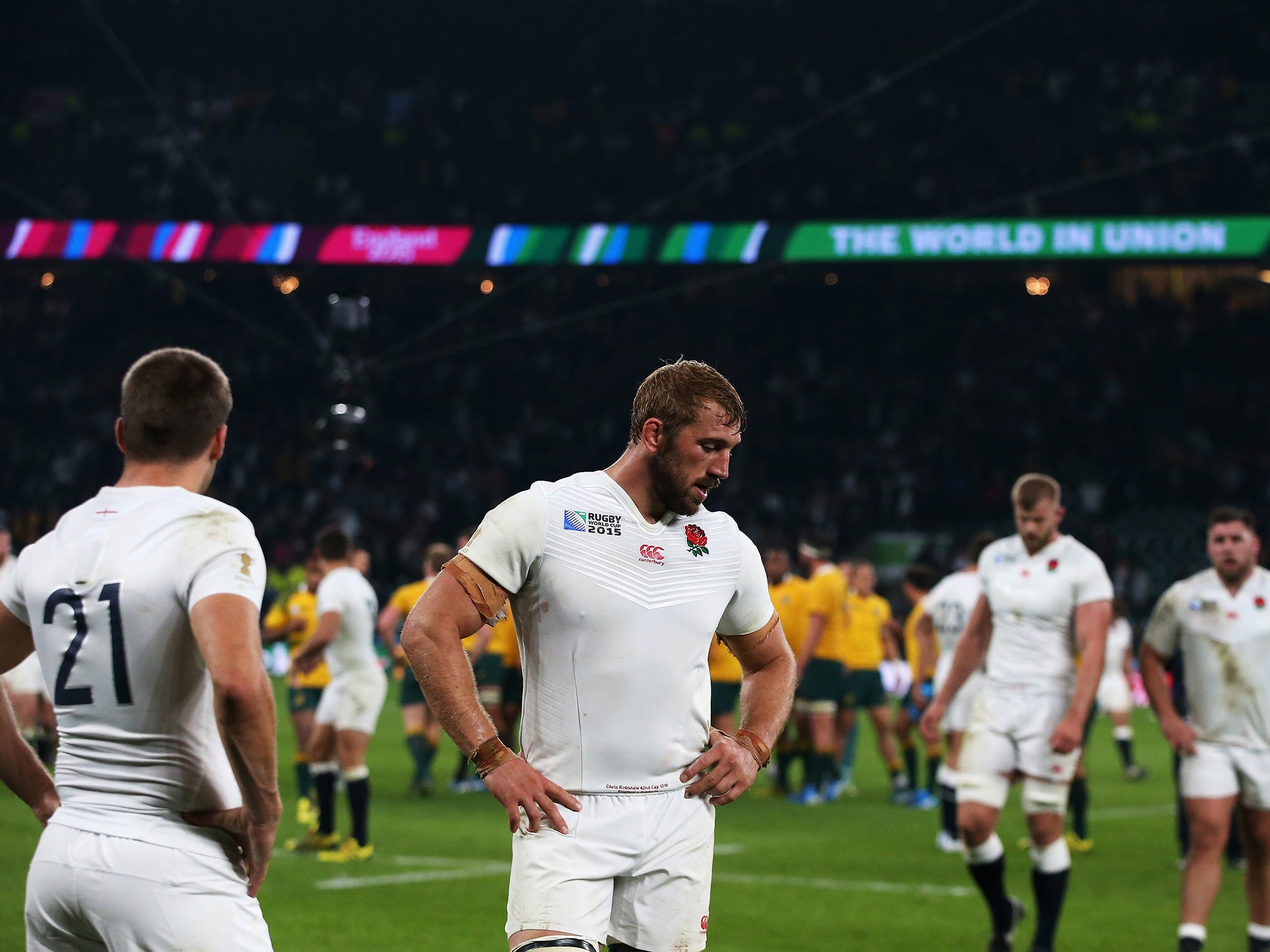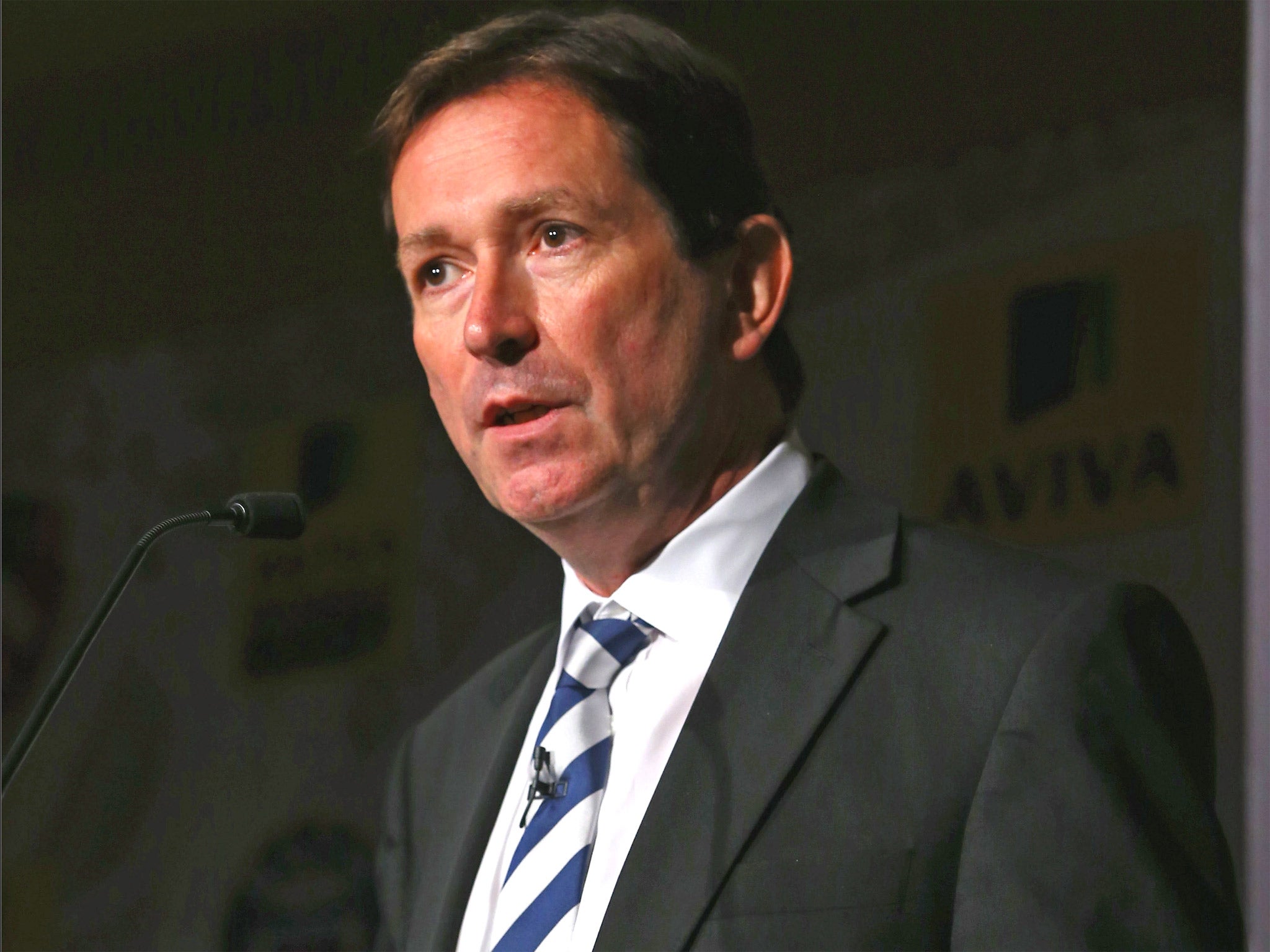Rugby World Cup 2015: Clubs take on country as England blame game turns to civil war
Chris Hewett considers the hostile state of relations between the Premiership elite and the RFU in the aftermath of England’s humiliating performance during the World Cup

Here it comes, bang on cue at the end of another painful World Cup episode: the Balkanisation of English rugby. The dispirited national team would struggle to beat Montenegro just at the moment, let alone the All Blacks, and there is more than a whiff of hostility in the air as everyone blames everyone else for a failure that will prove far more costly to the game in this country than a few million quid in lost merchandising.
Just as Twickenham’s five-man review panel began the cheerless task of weighing up the thoughts and excuses of players, coaches and support staff in an attempt to work out what the hell happened and why – a process that was mocked to within an inch of its life the moment the details were announced and still has people guffawing today – one of northern hemisphere rugby’s leading “stakeholders” could be heard advising the governing body to keep its nose out of red-rose affairs and leave the running of the Test side to somebody else.
Simon Halliday, who played for England in the 1991 World Cup final and is now top dog on the European club scene, suggested that the Rugby Football Union might usefully focus its attentions on the social game – on the “massive majority who play for fun” – and relinquish control of the “assets in the shop window” to a new independent body made up of specialists “united by a common purpose”.
It made a degree of sense in a radical kind of way – or rather, it would have done had the union game in England and the idea of “common purpose” not become strangers to each other decades ago. The strains between the RFU and the elite professional clubs may wax and wane, but relations are never completely cordial. And when the national team suffers a humiliation on this scale, the crockery tends to fly around the kitchen without the aid of wings (which is pretty much how England play their rugby when they pick a pair of non-passing centres, as they did against Wales last month).
Two of the finest coaches in the sport – Steve Hansen, who guided the All Blacks to a second successive world title and has lost only three games in four years; Brian Ashton, who took England to the global final in 2007 – have indicated in the last week that the red-rose model as currently set up is not fit for purpose. Neither man was explicit in his denunciation of the Premiership teams and the influence they wield, but their underlying messages were as clear as day.
When Hansen said that the absence of central contracts for the top players “made life more difficult” at international level and Ashton spoke of “egos and power struggles and battles to own the dominant voice”, they were aiming their searchlights at the dysfunctional alliance between club and country – a tie-up that unravelled so fast following England’s early departure from their own tournament the RFU decided to hold its review as far away as possible from the Professional Game Board, a joint body specifically created to bring the two sides closer together.
So it was that one after another the Premiership rugby directors clambered on to the barricades in defence of their “product” during this week’s launch of the European Champions and Challenge Cup tournaments.
The tone was set by Jim Mallinder of Northampton, who had no truck with the argument put forward by another wildly successful New Zealand coach, Graham Henry, that England’s problems started and ended with a set of substandard players. “Without doubt we have the players, from our props right the way through to the back three,” Mallinder said. “What we need to do internationally is get our game plan right, our recruitment right… to pick the right people for the right occasion.”

Mallinder brought supporting evidence with him, in the shape of recent reminiscences. If Exhibit A was this year’s Six Nations – “In some of the games, England were fantastic,” he said – Exhibit B was something a little closer to home. “I look back at some of the games Northampton have played in,” he continued. “The Premiership final we played in 2014, the Heineken Cup final we played against Leinster… that was quality rugby. It wasn’t 10-man, kicking rugby. It was forwards handling the ball, it was backs running hard and being physical and making tackles. We aren’t that far off. I think we need to be a little more positive about where we are.”
But those involved in the Premiership know they are in a fragile place. The academy programme underpinning the development of England-qualified talent could not be described as a triumph by anyone who cares for the language – the fact that the 12 top-flight clubs have drafted in more than 50 full-time professional players from outside the country since the end of last season tells you that much – and the profoundly damaging wrangle over alleged salary cap abuses has left the league so far away from the moral high ground it might as well be digging for coal.
It is perhaps worth reminding ourselves of a self-congratulatory statement issued by Premier Rugby itself in early October 2013, celebrating the consolidation of its very own financial fair play system. “Being open and transparent, both internally and externally, will support the management of the salary cap in many ways,” it read. “In particular, it will help promote the effective administration, management and governance of the cap.”
Open and transparent? Pull the other one. In light of the recent “financial settlements” reached with at least two high-performing clubs, whose lawyers managed to avoid straightforward fines by blurring the definitions of what may or may not have constituted a spending breach – settlements so cloaked in confidentiality, the deeply uncomfortable Premiership chief executive Mark McCafferty barely felt able to confirm the day of the week when discussing the issue during a hastily arranged and squirmingly excruciating conference call – that statement is not merely funny. It marks a new peak in the humour of embarrassment, knocking Alan Partridge and David Brent clean off the mountaintop.
The truth of the matter is that, to all intents and purposes, the cap no longer exists – partly because it is unenforceable in any meaningful sense and partly because the upper “limit” is now so high by union standards, the wealthier clubs can spend what they like. As one very senior figure in English rugby administration said this week: “When the cap was introduced in the late 1990s, there was a broad consensus. The investors were losing millions, everything was going down the Swanee and even the most gung-ho owners knew something had to be done to stop the bleeding. That is no longer the case.
“We’ve known for years that some chairmen wanted the cap abolished and that’s pretty much where we are today as a result of what has just happened. The Premiership clubs were desperate to spare themselves the pain of a civil war in the courts, so they kicked the can so far down the road you can no longer see it. Some were more reluctant than others to follow the confidentiality route, but the alternative was too grim to contemplate.”
All things considered, then, the Premiership has a tough public relations campaign ahead of it: there are too many people at Twickenham who do not believe the England team can fulfil its potential in a system where the players are “owned” by the clubs, and there are too many people up and down the country who no longer believe a word the clubs say when they claim to be operating on a level playing field.
And to cap it all, so to speak, the weather is about to turn grim. The only favourable conditions English rugby is likely to see between now and the end of February are those already in place for another vicious outbreak of rugby politics.
In his other life, the Premier Rugby chairman, Quentin Smith, is a lawyer specialising in arbitration and dispute management. If the clubs have any sense, they will ask him not to take any long holidays in the foreseeable future.
Join our commenting forum
Join thought-provoking conversations, follow other Independent readers and see their replies
Comments